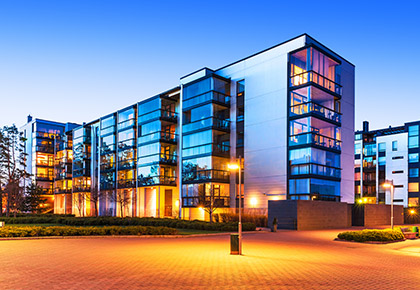Narrow Results
-

Empowering Communities: Maximizing efficiency through energy audits
Energy audits serve as a critical tool for identifying inefficiencies, pinpointing areas of improvement, and ultimately fostering a more sustainable environment within community associations. -

5 ways to reduce energy costs in your condo or coop
No matter where your high-rise building is located, rising energy costs can have a drastic impact on your community association’s budget. Implementing methods to conserve energy can help your association reduce energy costs and optimize your high-rise’s annual budget. -
12 to-do’s for ultimate HOA landscaping maintenance
A good spring-cleaning can do wonders for your community association. Here are some tips to get your started. -
What is The Best Pool Heater for Florida Communities?
Even in the sunny warmth of Florida, water in a swimming pool isn't usually warm enough. Solution? A pool heater. There are several options, each with pros and cons, according to Chris Normandeau, director of FirstService Energy. -
Energy Efficiency for Community Associations
Many community association boards and residents would like to implement energy efficiency measures in their communities. But what about the cost to get started? -
Five Ways to Get Ready for a Pool Inspection
A pool inspection can be a major source of anxiety for board members and residents. Don't throw in the towel; there are steps you can take to make sure your inspection goes...well, swimmingly. -

Tips for Reducing Energy Consumption and Costs in Your Community
Get helpful tips that your HOA or condo association can do to reduce energy consumption and lower your community’s electric bills. Learn more! -
Four Ways to Get Mosquitoes to Buzz Off
Ah, summertime in Florida. Backyard barbecues. Long days at the beach. And endless mosquito bites. -
Is Installing Electric Vehicles Charging Stations the Right Choice for Your Community?
The number of plug-in electric vehicles (PEVs) on the road is quickly growing, which means the need for conveniently located battery charging stations is also on the rise. What does this mean for your association? -
Is Your Community Ready for Plug-In Electric Cars (PEVs) and Charging Stations?
The Nissan Leaf and Chevy Volt made their debut as the first US mass-market plug-in electric vehicles (PEVs) more than five years ago. Nearly half a million have jumped on the PEV bandwagon. What does this mean for community associations? -
Should Your Community Install Car Charging Stations for Electric Cars
More Americans are switching from gasoline to electric vehicles (EVs). Residential properties are installing charging stations to stay relevant and positively impact property values. -
Summer Energy Costs: How Your Association Can Save
Longer Summer days mean temperatures in the high 90s and higher electric bills! An energy management program in your community can help lower costs and keep common areas comfortable. -
Part 1: Electric Cars and Charging Stations - Is Your Community Ready?
Ready to trade in your gas card for some time at the charging station? If so, you'll join those who have made the switch from gasoline-powered vehicles to plug-in electric vehicles (PEVs). -
Part 2: Installing Charging Stations for Electric Cars in Your Community
Electric cars have arrived and there has been a surge of plug-in electric vehicle (PEV) purchases driving the need for charging stations. What does this mean for your association? -
Four Ways Illinois Condos/Co-ops and HOAs Can Save Money on Energy Bills with the Best Property Management Services
Energy conservation and managing HOA community environmental footprints are crucial, but board members have a responsibility to homeowners to exercise financial prudence and proactively seek ways to manage rising costs. -
Asphalt Repairs: Fixing Winter’s Damage
As community managers begin inspection, they note the necessary repairs for winter damage as they make their rounds through the community. -
LED Lighting Offers a Bright Way for Condo Associations to Save
Has your condo association been looking high and low for ways to save energy and money? The answer may be right over your head. Switching to LED bulbs can reduce your lighting costs by up to 75 percent. In this article, we answer common questions and shed some light on the benefits of LED lighting. -
Getting Your Building’s Spring Cleaning Started
As community association managers begin their inspection, they note the necessary repairs for winter damage as they make their rounds through the community. The spring season is a time for renewal and a fresh look, so being able to properly landscape around the building is of utmost importance. -
Four Elements of Great Community Landscaping
Without a doubt, beautiful landscaping makes life in your community more enjoyable. But did you also know that it can play a crucial role in boosting your community’s reputation in the marketplace, and consequently enhancing property values? -
3 Strategies to Keep HOA Assessments Stable and Add Value
There are valid reasons to raise assessments, but in some cases, you may be able to go a different route. Here are three strategies to save your HOA money and keep assessments stable. -
Vetting Vendors: A path to success
Replacing a trusted vendor or finding a new one can be a challenge. How can you have peace of mind that the vendors you’re considering are right for you? Follow the tips below to help screen potential vendors and get the best fit for your association. -
Commercial Observer-Grading Buildings on Energy Consumption
A new law will require residential and commercial buildings to prove their energy efficiency -
Habitat Magazine-Here Are Ways to Pay for Retrofits to Reduce Carbon Emissions
The Climate Mobilization Act, requires buildings 25,000 square feet and larger to reduce greenhouse gas emissions by certain target percentages in 2024, 2030, and beyond. -
Habitat Magazine-Here Are the First Steps to Cutting Building Carbon Emissions
Buildings are New York City's biggest polluters, which is why the Climate Mobilization Act will require most co-op and condo boards to reduce their buildings’ carbon emissions sharply in coming years.